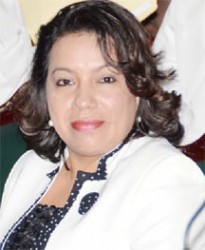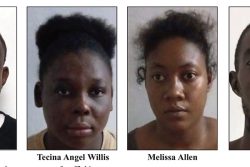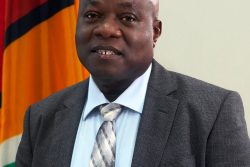The setting of a process to define the maritime boundary between Guyana and Venezuela was a satisfactory outcome of the October 17 talks between the two states following Caracas’ seizure of the research vessel RV Teknik Perdana, Minister of Foreign Affairs Carolyn Rodrigues-Birkett has said.
Rodrigues-Birkett and her Venezuelan counterpart Elias Jaua Milano met in Trinidad on October 17 following the Venezuelan Navy’s seizure of the oil exploration vessel R/V Teknik Perdana on October 10. Both sides claimed that the vessel was in their waters. Caracas subsequently charged the captain of the vessel with allegedly violating

Venezuela’s exclusive economic zone and the vessel and the rest of the crew were later released.
At Guyana’s insistence, a paragraph in the Joint Statement issued after the meeting, was agreed on which has served to establish a process for the eventual delimitation of the maritime boundary between Guyana and Venezuela, Rodrigues-Birkett said in a statement to the National Assembly yesterday. She said that the meeting was fruitful, in that it resulted in all of Guyana’s principal objectives being met. These objectives were the immediate release of the RV Teknik Perdana and the safe return of its crew; and the establishment of a process for the maritime delimitation of the boundary between Guyana and Venezuela.
“I believe in all honesty Mr. Speaker that these were satisfactory outcomes given the circumstances and the inevitable and indeed quite understandable pressures to act otherwise,” the minister said.
She informed that letters were dispatched to the Secretaries General of the Caribbean Community, the Organisation of American States, the Commonwealth and the United Nations as well as to the Foreign Minister of the Republic of Suriname in that country’s capacity as Pro Tempore Chair of UNASUR, apprising them of the situation and the outcome of the meeting with the Venezuelan Foreign Minister.
According to the minister, a few have sought to find fault with the Joint Statement that was signed at the conclusion of the October 17 meeting. It must be noted, however, that Venezuela was unshakable in its position that according to its line of delineation, the RV Teknik Perdana was in Venezuelan waters. “On behalf of my Government and my country, I maintained that the vessel was in Guyana’s waters,” she said.
She had noted that both Guyana and Venezuela are in agreement as to the precise location where the research vessel was detained and escorted under arms to a Venezuelan port. “It is an incontrovertible fact, supported by all the relevant principles of international law, that the RV Teknik Perdana was well within Guyana’s waters,” the minister said.
Rodrigues-Birkett said that some people have asked the question, how is it that both Guyana and Venezuela claim that the vessel was in their jurisdiction and have also asked if this was because of the illegal claim that Venezuela has on Essequibo. “Mr. Speaker, the short answer is the land border, which involves Essequibo, has been settled in 1899 as previously mentioned but the maritime boundary has not yet been settled,” she said.
The minister said that the question will then be asked, how then do we know that the RV Teknik Perdana was in Guyana’s jurisdiction. “As representatives of our people, it is important that we grasp the considerations of international law that affect the delimitation of the maritime boundary of adjacent States. Of course the example with which we are all familiar is the settlement of Guyana’s maritime boundary with Suriname under the United Nations Convention on the Law of the Sea (UNCLOS). The Tribunal in the case between Guyana and Suriname, as many other Tribunals with the same mandate did, stated that “The process of delimitation is divided into two stages. First the court or tribunal posits a provisional equidistance line which may then be adjusted to reflect special or relevant circumstances”,” she said.
The Foreign Minister said that it is using the method of equidistance that Guyana has declared its provisional maritime boundaries ever since 1977. “This is how we know Mr. Speaker, that the vessel at the time of its interception was in Guyana’s waters. If Venezuela were to follow the same internationally recognized principles, its provisional boundary line would be west of Guyana’s line,” she declared.
The minister emphasized that under UNCLOS and customary international law, States are permitted to delineate their maritime boundaries. If the entitlement overlaps with another State, then the two States have to agree or enter into dispute settlement.
Succumb
“Mr. Speaker, it is tempting to succumb to the view that Guyana should have denounced Venezuela before the international community and publicly placed in question Venezuela’s sincerity regarding the construction of a regime of durable good neighbourliness,” she said. In putting those view in perspective, the minister said that the relations between Guyana and Venezuela, ever since Guyana’s independence in 1966, have been bedeviled by intermittent threats, acts of intimidation, seizure and attempted seizure of territory and various forms of economic aggression all committed by Venezuela in a vain attempt to break Guyana’s will and to force concessions in relation to its illegal claim to the Essequibo region.
“Over the past decade and particularly after His Excellency Hugo Chavez became President of Venezuela, there has been a marked improvement in Venezuela’s attitude towards Guyana. The Government of Guyana seized this opportunity to strengthen the bonds of friendship and cooperation with Venezuela,” Rodrigues-Birkett said.
“The various agreements signed between the two countries during this period as well as the developments in the Essequibo that proceeded apace without the customary negative reaction from Venezuela, provide clear evidence of the success of such a strategy and its positive impact on Guyana’s programmes for development. When His Excellency President Nicolas Maduro Moros paid his State visit to Guyana on 31 August 2013 his public remarks confirmed that the ties between the two countries were firm and that our boundary disagreements should be seen for what they are – legacies of the past to be dealt with now in a mature and responsible manner,” she asserted. “Are the various agreements signed and related programmes to be deemed worthless now? Do we in light of the 10 October incident return to those ‘darkest days’ of which I spoke earlier or to those days of development uncertainties,” she questioned adding that she would hope not.
“But in saying so, let me make this quite clear. The Government of Guyana will do what it can to establish a regime of peace, security and beneficial cooperation with Venezuela and has therefore in this instance opted to pursue a course of reasoned dialogue as the preferred course of action to safeguard Guyana’s sovereignty and territorial integrity. But Guyana will not, I repeat will not, compromise its principles nor sacrifice any of its national patrimony for ephemeral gains displayed on the altar of cooperation,” the foreign minister declared.
She had noted that during the discussions, the Venezuelans requested that the matter be brought to the Good Offices Process but Guyana pointed out that this was not within the mandate of the Good Offices Process and unless a new mandate was given this was not possible at this time.









